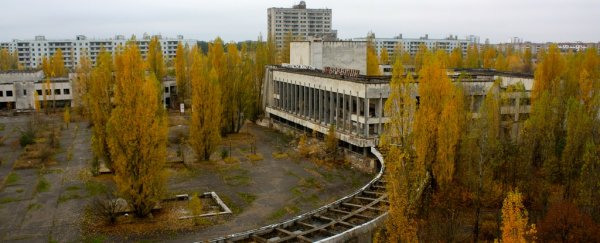The Ukrainian government has announced a plan to turn the area surrounding Chernobyl - the site of one of the worst nuclear meltdowns in history - into a solar energy farm, by constructing a series of solar panels inside the exclusion zone.
Not only would this plan - which is currently seeking investment - allow the country to use a giant chunk of radioactive land that's unfit for human settlement, it would also provide a cheaper source of reusable energy that might decrease the country's reliance on Russia.
"The Chernobyl site has really good potential for renewable energy," Ukraine's environment minister Ostap Semerak said in an interview in London. "We already have high-voltage transmission lines that were previously used for the nuclear stations, the land is very cheap and we have many people trained to work at power plants."
Thirty years ago, Chernobyl - a city roughly 100 kilometres (62 miles) from Kiev - was rendered toxic after a nuclear meltdown triggered a mass evacuation.
Now, all these years later, a large section of roughly 2,600 square kilometres (1,000 square miles) of land in and around Chernobyl is still unsuitable for human settlement.
So in an effort to make that land viable again, the government is attempting to fund the construction of a series of solar panels that, when finished, will provide roughly 4 megawatts of power for the country's citizens. According to the California Energy Commission, 1 megawatt is enough to power 750 to 1,000 homes, so 4 megawatts could make a big difference for the Ukranian locals.
Besides a new source of clean power, the government also says the installation of the panels will hopefully decrease the country's dependence on Russia, which supplies them heavily with natural gas, and further align them to join the European Union, which recently increased its focus on environmental issues.
"We have normal European priorities, which means having the best standards with the environment and clean energy ambitions," Semerak told the press. "We want to be a successful Ukraine, to show people in the conflict zone that life is better and more comfortable with us."
Right now, though, Ukrainian officials are trying to lock down the funds needed for the expensive project. They're in talks with two US investment firms and four Canadian energy developers, reports Anna Hirtenstein for Bloomberg.
There's no word on how the construction of the solar panels would play out just yet, but judging from a report from earlier this year that found that milk produced at the edge of the exclusion zone contains roughly 10 times the amount of acceptable radiation, it's going to be a serious challenge to ensure the safety of workers even outside the abandoned city.
Hopefully, if the solar panels project does end up being successful, the wildlife inside Chernobyl won't be disturbed during the installation phase. A study from 2015 found that the area's wildlife has actually started to rebound after the disaster, despite the dangerous levels of radiation.
As Peter Dockrill reported for us in October:
"Now, some three decades later, the animal population of the Chernobyl Exclusion Zone is positively thriving, despite the lingering radiation that still permeates the landscape.
The sheer fact that virtually all of the area's human residents cleared out after the disaster, creating an impromptu wildlife habitat free from the negative impacts we usually pose to animal species, seems to have done them a world of good."
It will take some time to know whether or not Ukraine will go forth with its plan. Until then, if you were you wondering what Chernobyl looks like today, check out the incredible footage below:

